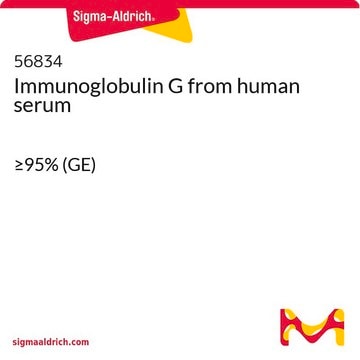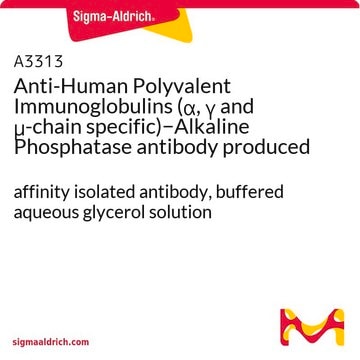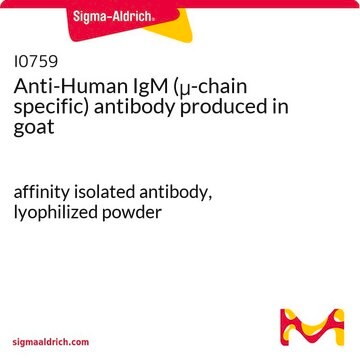I8010
Anti-Human Polyvalent Immunoglobulins (G,A,M) antibody produced in rabbit
whole antiserum
Sign Into View Organizational & Contract Pricing
All Photos(1)
About This Item
Recommended Products
biological source
rabbit
Quality Level
conjugate
unconjugated
antibody form
whole antiserum
antibody product type
secondary antibodies
clone
polyclonal
contains
15 mM sodium azide
technique(s)
immunoelectrophoresis: suitable
shipped in
dry ice
storage temp.
−20°C
target post-translational modification
unmodified
Related Categories
General description
Immunoglobulin G (IgG) belongs to the immunoglobulin family and is a widely expressed serum antibody. IgG is usually found as a monomer. IgG antibody subtype is the most abundant of serum immunoglobulins of the immune system. About 70 percent of the total immunoglobulin consists of IgG. Immunoglobulin M (IgM ) is a high molecular weight protein that has five or six subunits. It is the first immunoglobulin produced by neonates.
Application
Anti-Human Polyvalent Immunoglobulins (G,A,M) antibody produced in rabbit has been used in enzyme-linked immunosorbent assay (ELISA) and sandwich ELISA.
Anti-Human Polyvalent Immunoglobulins (G,A,M) antibody produced in rabbit was used in sandwich ELISA as a standard.
Biochem/physiol Actions
IgG antibody subtype is the most abundant of serum immunoglobulins of the immune system. It is secreted by B cells and is found in blood and extracellular fluids and provides protection from infections caused by bacteria, fungi and viruses. Maternal IgG is transferred to fetus through the placenta that is vital for immune defence of the neonate against infections. IgA antibody is secretory antibody and is present abundantly in mucous linings of gastrointestinal, respiratory and genitourinary tracts, tears and saliva. IgM antibodies are present as pentamers in the serum and are produced in response to antigens.
Immunoglobulin M (IgM) acts as an antigen specific part of the B cell antigen receptor on the surface of B lymphocytes that are not stimulated, in its monomeric form. Polymeric IgM molecules also serve as important activators of the classical complement cascade. IgM is essential in agglutination and cytolytic reactions. Immunoglobulin G (IgG) participates in hypersensitivity type II and type III.
Disclaimer
Unless otherwise stated in our catalog or other company documentation accompanying the product(s), our products are intended for research use only and are not to be used for any other purpose, which includes but is not limited to, unauthorized commercial uses, in vitro diagnostic uses, ex vivo or in vivo therapeutic uses or any type of consumption or application to humans or animals.
Not finding the right product?
Try our Product Selector Tool.
Storage Class Code
10 - Combustible liquids
WGK
nwg
Flash Point(F)
Not applicable
Flash Point(C)
Not applicable
Certificates of Analysis (COA)
Search for Certificates of Analysis (COA) by entering the products Lot/Batch Number. Lot and Batch Numbers can be found on a product’s label following the words ‘Lot’ or ‘Batch’.
Already Own This Product?
Find documentation for the products that you have recently purchased in the Document Library.
Julia Knöckel et al.
Molecular & cellular proteomics : MCP, 20, 100038-100038 (2021-01-31)
Sporozoites are a motile form of malaria-causing Plasmodium falciparum parasites that migrate from the site of transmission in the dermis through the bloodstream to invade hepatocytes. Sporozoites interact with many cells within the host, but the molecular identity of these
C G Bridges et al.
Antimicrobial agents and chemotherapy, 40(5), 1072-1077 (1996-05-01)
The novel acyclonucleotide derivative of guanine, 9-[2-methylidene-3-(phosphonomethoxy)propyl] guanine (MDL 74,968), had antiviral activity comparable to those of 9-(2-phosphonomethoxyethyl) adenine (PMEA) and 2',3'-dideoxyinosine against laboratory strains of both human immunodeficiency virus (HIV) types 1 and 2 cultured in MT-4 cells and
MDL 74,968, a new acyclonucleotide analog: activity against human immunodeficiency virus in vitro and in the hu-PBL-SCID. beige mouse model of infection.
Bridges CG, et al.
Antimicrobial Agents and Chemotherapy, 40(5), 1072-1077 (1996)
The severe combined immunodeficient-human peripheral blood stem cell (SCID-huPBSC) mouse: a xenotransplant model for huPBSC-initiated hematopoiesis
Goan SR, et al.
Blood, 86(1), 89-100 (1995)
S R Goan et al.
Blood, 86(1), 89-100 (1995-07-01)
Mononuclear cells (MNCs) containing peripheral blood stem cells (PBSCs) were obtained from solid-tumor patients undergoing mobilizing chemotherapy followed by granulocyte colony-stimulating factor for PBSC transplantation-supported dose-intensified anticancer chemotherapy and were transplanted into unconditioned "nonleaky" young severe combined immunodeficient mice. Multilineage
Our team of scientists has experience in all areas of research including Life Science, Material Science, Chemical Synthesis, Chromatography, Analytical and many others.
Contact Technical Service








